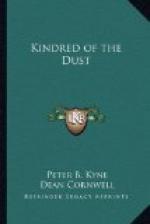The other picture was the pose in which he had seen her the morning previous at the Sawdust Pile, when, to hide her emotion, she had half turned from him and gazed so forlornly out across the Bight of Tyee. It had struck him then, with peculiar force, that Nan Brent never again would laugh that joyous elfin laugh of other days. He had seen the pulse beating in her creamy neck again—a neck fuller, rounder, glorious with the beauty of fully developed womanhood. And the riot of golden hair was subdued, with the exception of little wayward wisps that whipped her white temples. Her eyes, somewhat darker now, like the sea near the horizon after the sun has set but while the glory of the day still lingers, were bright with unshed tears. The sweet curves of her mouth were drawn in pain. The northwest trade-wind blowing across the bight had whipped her gingham dress round her, revealing the soft curves of a body, the beauty of which motherhood had intensified rather than diminished. Thus she had stood, the outcast of Port Agnew, and beside her the little badge of her shame, demanding the father he had never known and would never see.
The young laird of Tyee wondered what sort of man could have done this thing—this monumental wickedness. His great fists were clenched as there welled within him a black rage at the scoundrel who had so wantonly wrecked that little home on the Sawdust Pile. He wondered, with the arrogance of his years, assuming unconsciously the right of special privilege, if Nan would ever reveal to him the identity of the villain. Perhaps, some day, in a burst of confidence, she might. Even if she did tell him, what could he do? To induce the recreant lover to marry her openly and legally would, he knew, be the world’s way of “righting the wrong” and giving the baby a name, but the mischief had been done too long, and could never be undone unless, indeed, a marriage certificate, with proper dating, could be flaunted in the face of an iconoclastic and brutal world. Even then, there would remain that astute and highly virtuous few who would never cease to impart in whispers the information that, no matter what others might think, they had their doubts. He was roused from his bitter cogitations by the chauffeur speaking.




